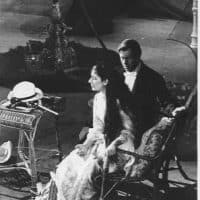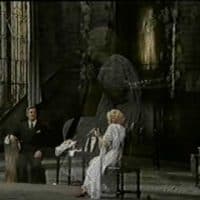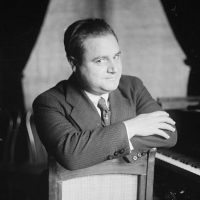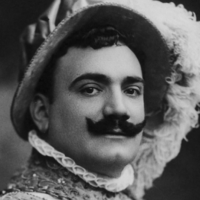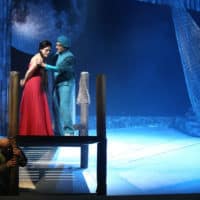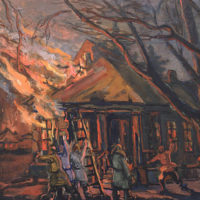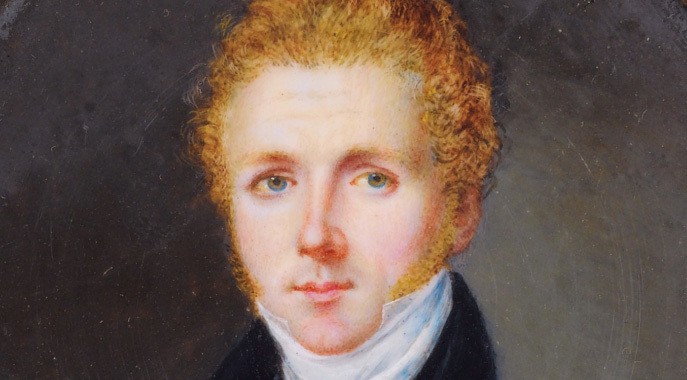
Bellini’s musical training was first within the family then continued under Nicola Zingarelli at the Naples Conservatory when he became thoroughly familiar with the works of Haydn, Mozart and Pergolesi. A decisive experience was with a performance in Naples of Rossini’s Semiramide (1824) after which Bellini devoted himself entirely to the stage. His second opera Bianca and Fernando caught the attention of the impresario Domenico Barbaia, who commissioned an opera for La Scala Milan Il Pirata (1827) which was the beginning of a long collaboration between Bellini and the librettist Felice Romani. They produced a string of successes which only came to an end after the initial failure of Beatrice di Tenda (1833) over which they seriously disagreed. Bellini subsequently left Italy, first travelling to London before finally settling in Paris where he became the darling of the operatic world. His final opera was I Puritani (1835) whose premiere he survived by only a few months, dying at the age of 34 (Ack: Andreas Batta).
Bellini’s operas are distinguished by a highly developed melodiousness imbued with romantic pathos, by their sublime dignity and by their profound sentimentalism. As a melodist, Bellini had a far-reaching influence on composers both of opera (Verdi and Wagner) and of instrumental music (Chopin and Liszt).
Norma holds a special place among the great female operatic roles. Based on a tragedy by Louis Alexandre Soumet, Romani made major changes for for the operatic stage by enriching the already complex female character with two further aspects. (a) Her undying love for Pollione and (b) her equally profound love for her children. Whereas in Soumet’s tragedy, Norma kills her children in her madness, Bellini and Romani do not go so far. The finale is one of the most shattering operatic scenes of all constructed around a great single melody. It is a musico-dramatic climax that found worthy successors two decades later in Wagner’s Die Die Walküre and Tristan und Isolde.
Over the past century there have been many recordings of Norma, not all of them memorable, and in the early months of 2013 they were joined by yet another with the mezzo-soprano Cecilia Bartoli in the title role. This recording seeks to produce a Norma as it would have sounded when it was new so before it can be discussed, let us attempt to turn the clock back to the mid-19th Century.

In the mid-19th Century we encounter a totally different operatic world to the one we know today. Even though Bellini’s life was tragically cut short when he was only 34, he was not a prolific composer. He only composed 10 operas whereas in the same time span Pacini composed almost 20 and Donizetti composed coming up to 30. Every year operas were churned out at an astonishing rate and an opera that last twenty years was a rarity. In 1845, 11 years after Bellini’s death, the Leipzig Allgemeine musikalische Zeitung’s Italian correspondent noted that in the previous 8 years, 342 new operas had been staged in Italy alone and 130 new composers (Verdi included) had made their debut.
While Bellini and Romani had a very successful working relationship, it was just as important for an opera composer to have the same sort of understanding with his singers. It was unthinkable that an opera would be composed without certain artists in mind, in the hope that somehow the right performers would just materialize. By the same token, operas were written for specific companies, theatres and for specific occasions and seasons. In composing Norma, Bellini had no difficulty in assigning the minor roles. In the cases of the characters Clothilde and Flavio, they were to be taken by Marietta Sacchi and Lorenzo Lombardi, both of whom had worked amicably with Bellini on previous occasions but the major roles of Norma, Pollione and Adalgisa were a different matter. For the role of Norma, Bellini selected Giuditta Pasta. They had become close friends and confidantes (some commentators have her as Bellini’s mistress) and for Bellini, she could do no wrong. She was in her mid-thirties and one of the most famous singers of her time with, we are told, the vocal capability to sing from the contralto range through the mezzo-soprano range and into high soprano territory coupled with impressive power and resonance. She had previously created the role of Amina in La Sonnambula for Bellini and after her debut as Norma at La Scala Milan, the role of Norma was to become one of her most famous. For the role of Pollione, Bellini wanted the tenor Rubini who had previously created the roles of Gernando, Gualtiero and Elvino for him but unfortunately Rubini was not available so the role went to Domenico Donzelli who was a distinguished enough artist. He and Bellini corresponded politely but with a little pomposity from Donzelli who went on to sing the role in Vienna and London but with no further close association with Bellini. The role of Adalgisa went to Pasta’s elder sister, Giulia Grisi who was a famous and accomplished soprano in her own right although any details of her relationship with Bellini remain very limited.
Norma premiered on the 26th December 1831 at La Scala to a rather mixed reception. Opera politics apparently played their part and in other commentaries it has been described as a ‘fiasco’. Bellini indeed expressed some disappointment and he was to write”…………..despite a hostile faction, formed with large sums of money poured out by that mad woman who is the protector of another composer, whom you will easily guess……………..the applause is unanimous: if these things indicate a fiasco, then Norma has been a fiasco.” On the 5th January, Bellini left Milan to visit Naples and Sicily, satisfied (with one or two reservations) that Norma was a success. By the end of the season, 24 performances had clearly established that success.
So now we come to the 2013 recording and how it measures up against previous recordings. Having read, researched, scratched, scribbled and listened I find that Robert Levine hits the nail fairly and squarely on the head with his review entitled:
Not your Parents’ Norma but Norma nevertheless.
It’s a brilliant review; I found myself nodding in agreement. An excerpt from the review:
“The long slow passages are ravishing ( perhaps greater than Caballe’s simply because they are integrated and do not draw attention to themselves) and imply an intimacy that makes us identify with Norma’s plight; her diction is impeccable. She occasionally stumbles in imposing moments because her voice is simply too small. Shortly before she calls for war, for instance. I wouldn’t bet that her vibrato is anything like what audiences in the 1830’s heard; it’s too prominent. But you will hear things in her performance that will illuminate aspects of the character as never before.
Sumi Jo, as we know, is a gorgeous singer, but one whose technical proficiency always has trumped her interpretive abilities. Here she has plenty to react to emotionally, and her slim tone, still lovely, does its best at expressing Adalgisa’s almost constant sense of unease, she’s stunning in her duets with Bartoli. John Osborn, a truly lyric tenor, sound properly young, has no fear of heights and gains confidence as his aria and cabaletta progress. He does a remarkable job with Adalgisa, alternately seducing and browbeating her, and in his confrontations with Norma he sings with assurance and every dynamic shade imaginable, winding up a sympathetic character. It’s not your uncle’s macho Pollione, but I suspect it will win you over as he realises what he has done. Michele Pertusi’s Oroveso is the most orthodox interpretation here; the voice is not a thunderous bass, but he knows how to thunder nonetheless. The Flavio and Clethilde sing their texts meaningfully.
The recording is peculiar; Bartoli is miked too closely and there is so much reverb following the voices that you sometimes feel the “recording” rather than the music. Fight through it, however, and the music will captivate. Many in the Bloguniverse are treating this undertaking as a sin against Bellini, whereas what they mean is that it’s a sin against Callas, et.al. Nonsense. While I suspect that this cast would not pack the wallop on stage that it does here, it is a pleasure to hear it stripped and clear.”
A trailer for the recording:
